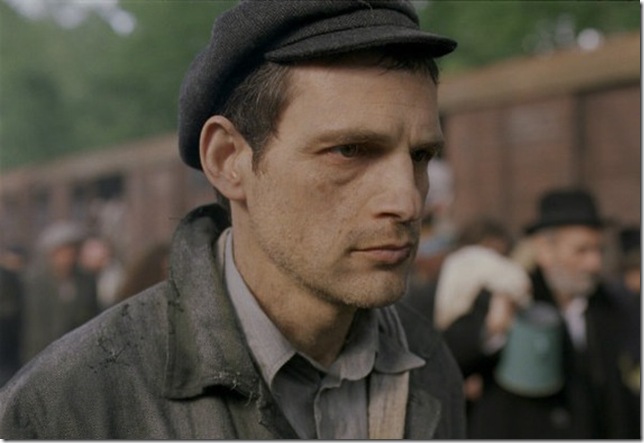Son of Saul is a symphony of genocide in surround-sound. Trucks heave and chug, carrying the cargo of lives soon to be incinerated. Death machines hiss and pound and whir, and metal scrapes metal. Gunfire and bombs resound from the very near distance. Dogs bark at everything. There are wails, protests and prayers in Yiddish that are untranslated, because why bother?
The setting is Auschwitz in 1944, and aside from some exteriors late in the film, we never leave the death camp. The aural cacophony alone is stifling, to say nothing of the visuals. Shooting in the square 1:33:1 aspect ratio, first-time Hungarian director László Nemes restricts our vantage to the cloistered perspective of Saul Auslander (Géza Röhrig), our Virgil in this infernal milieu. Saul is a member of the Sonderkommando — a group of hundreds of Jewish prisoners forced to shepherd their own kind to the gas chambers and then clean up the “pieces” (the euphemism favored by Saul’s overseers) — until they themselves are deemed no longer necessary.
As Saul implacably goes about this toxic, dehumanizing work, our visual field is limited to his immediate circumference. The camera lingers, Dardenne Brothers-style, in verité fashion over his shoulders or darts in front of his gaze, like an obtrusive gnat or a relentless paparazzo. The result is a disorienting rigor that decontextualizes the Holocaust as one man’s micro-focused drudgery.
As we follow his routine over a day and a half, the camp’s architecture emerges — the Sonderkommando’s sleeping and dining quarters, the gas chambers, the morgue, the crematorium, the nearby beachfront where ashes are dumped into the ocean. The emaciated bodies are literally a blur — whether wheeled about the facility like meat carcasses in an abattoir or unceremoniously executed at the barrel of the gun, they remain forever out of focus.
While violence is omnipresent in Son of Saul, it is always abstract — heard rather than seen, implied rather than depicted. Some critics of this divisive film might take issue with this aspect: By avoiding a direct engagement with the victims, Nemes buries the lede, to put it mildly. I get that. But it’s important to remember that this is Saul’s story, and his survival is predicated on the compartmentalization of his work. To truly see his horrifying reality is to hardly be able to live with himself. (And besides, Alain Resnais’s unforgettable Night and Fog provided enough images of the executed that anyone would ever need to see).
Members of the Sonderkommando cope with the ceaseless traumas of their positions in various ways; some plan a resistance and revolt, enlisting Saul to assist them in smuggling gunpowder for a pending takeover. But Saul’s obsessive motivation is more basic: When he sees the body of a young boy, he becomes convinced that it is his son, and will spend the rest of the picture’s running time attempting to clandestinely arrange a proper Jewish burial for the boy.
Whether the child is Saul’s is immaterial. Saul is one cog in a mechanism of death, striving for the one minor disruption he might be able to control — the one quest to grant meaning to his dwindling life. In that sense alone, this resolutely avant-garde experimental film shares something in common with popular Liam Neeson actioners — a single-minded protagonist relentless in meeting his goal against all odds and conventional wisdom.
Rohrig’s remarkable performance, if you can call it that, is textbook Bressonian nonacting — a pair of disproportionate eyes sunk in concave sockets, stubbly facial hair, a cold sore on his lip suggesting malnutrition, all it creating a self-erasing slate. That new droid in Star Wars: The Force Awakens emotes more. This, again, is of a piece with Saul’s necessary ability to disconnect from the tragedies around him.
No tears are shed, from Saul or anyone else. There’s no equivalent here of Oskar Schindler dropping to his knees in weepy guilt, and it goes without saying that Nemes leaves no room for the ghastly sentiments of Life is Beautiful.
This is not that kind of Holocaust movie. Its presentation is so uncompromisingly matter-of-fact, so coarse, so deadened in every way that even audience members with flimsy floodgates probably won’t need a hanky. It is possibly the first Holocaust drama since Shoah to sensationalize nothing, and if this landmark achievement is difficult to grasp and comprehend — let alone enjoy — that is very much the point.
SON OF SAUL. Director: László Nemes; Cast: Géza Röhrig, Urs Rechn, Levente Molnar; Distributor: Sony Pictures Classics; Rating: R; Opens: Friday at Carmike Muvico Parisian in West Palm Beach, Movies of Lake Worth, Movies of Delray, Living Room Theaters at FAU, Cinema Paradiso in Fort Lauderdale, and the Tower Theater in Miami
